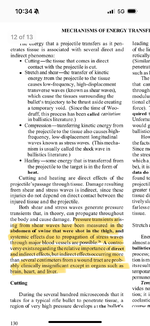@Article 4, for the record I’m not arguing that ballistics gel is bad or that a bigger cartridge doesn’t add any additional wounding capability. Your initial posts, however, came across as a throwing out technical jargon to appear to have a strong case, but actually pulled that jargon from a non-ideal source which had the result of weakening rather than strengthening your argument.
The WP review article in post #179 is on point to your argument regarding pressure waves and trauma. How to extrapolate from a 500 ft/lb enables shock conclusion to how the OPs experience would have gone had he shot a 300 RUM or had he used a 6 Creed instead of his 7 PRC is ultimately the question.
I am not a terminal ballistics expert nor do I expect to ever become one.
I jumped into this thread when I read your post that had a bunch of technical jargon, but seems to use that jargon as a hammer to impress, while the background source seemed less then ideal for answering the OPs question.
I’m not refuting your argument as meritless. But if we’re going to use ‘expert’ data, then those data should be explained in relatable terms to the non-experts here. And if you or I or anyone else can’t explain how an elastic-plastic strain-hardening model for gel deformation helps the OP decide if a smaller vs larger caliber would have helped in his situation, then we shouldn’t be writing those words.
Pretending to be an expert by using big words gets my hackles up since I assume you’re pulling the wool over my eyes. Clearly being able to explain how the data and the science explain the OPs results and how a bigger (or smaller, or broadhead, etc) would have resulted in a better outcome demonstrated true expertise.
Been fun chatting back and forth, but now back to my day job where my boss consistently expects me to be a ‘expert’ in what I do. Sadly it’s not hunting.




